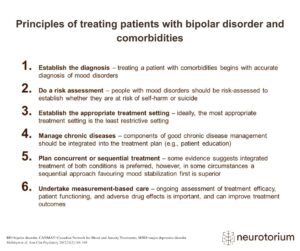Substance-use disorders are common among people with bipolar disorder (BD), and because alcohol is available and socially acceptable in many parts of the world, clinicians should be aware of the potential of alcohol-use disorder comorbid with BD. The presence of alcohol-use disorder in a person with bipolar disorder can complicate the disease course and treatment outcomes of the bipolar disorder, and vice versa.1 An integrated approach to treatment can recognize this comorbidity, and the interaction between them.1





